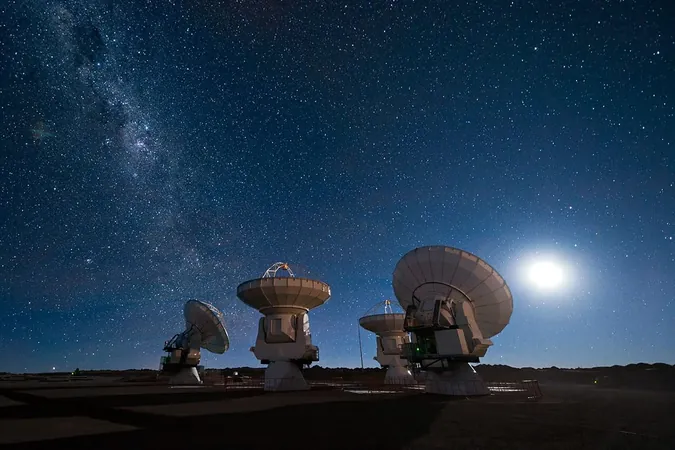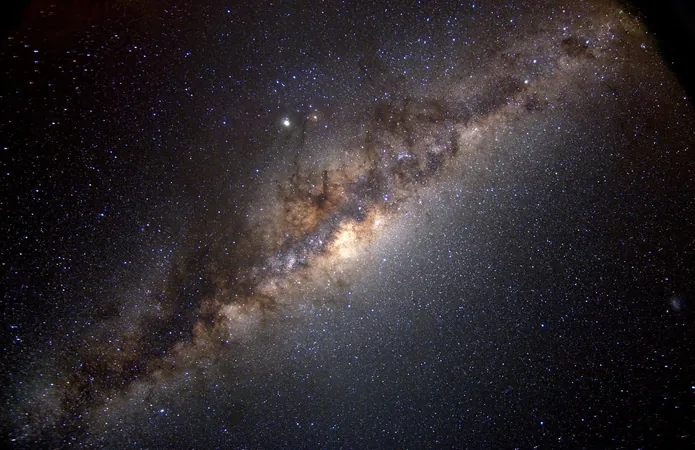
The Battle for Earth’s Darkest Skies: How Astronomers Are Fighting Light Pollution
2025-09-20
Author: Benjamin
Chile's Atacama Desert: A Celestial Sanctuary
In the heart of Chile lies the Atacama Desert, renowned as one of the most extraordinary astronomical sites on our planet. With its pitch-black nights, stable atmosphere, and minimal humidity, it provides unparalleled conditions for stargazing and astronomical research.
A Hub for Groundbreaking Astronomy
This breathtaking desert is home to some of the most advanced observational facilities, including the European Southern Observatory's (ESO) Very Large Telescope and the upcoming Extremely Large Telescope—set to revolutionize our understanding of the cosmos.
Light Pollution: A Growing Threat
But dark skies are increasingly under siege from light pollution, which hampers our ability to view the Universe as it truly is. Despite its prime celestial location, the Atacama is not immune. Even in this haven, artificial light is creeping in, jeopardizing the clarity of the night sky.
Insights from Experts
To understand the peril facing this astronomical paradise, we turn to Itziar de Gregorio-Monsalvo, an astrophysicist and ESO representative in Chile. According to de Gregorio-Monsalvo, the Atacama’s clear skies are unmatched for various astronomical observations, especially in optical and infrared wavelengths.
What Exactly Is Light Pollution?
Light pollution is the excess brightness in the night sky caused by unnecessary artificial lighting, such as poorly placed streetlamps and overzealous LED use. This interference complicates observations, making it hard to discern distant celestial objects from the haze of human-made light.
Industrial Threats Looming Over the Night Sky
Alarmingly, projects like the INNA green hydrogen facility pose a significant threat to the quality of the Atacama's skies. Located dangerously close to ESO's Paranal observatory, this project will not only flood the area with light but also create vibrations that could misalign the sensitive mirrors of future astronomical installations.
Proactive Measures by ESO
In response to these pressing challenges, ESO has been proactive. They are advocating for a safer distance between the proposed industrial projects and the observatory to minimize light and vibration pollution. They've submitted formal proposals to the Chilean government, emphasizing the importance of maintaining the sanctity of dark skies.
Global Initiatives Against Light Pollution
Beyond immediate threats, ESO is actively collaborating with local governments and international observatories to combat light pollution. They're committed not only to preservation but also to spreading awareness about the critical need to protect our night skies.
Why Dark Skies Matter
Dark skies are not just beautiful—they are essential for humanity. As urban development proliferates, our connection to the stars diminishes. Losing access to the night sky would not only rob future generations of awe-inspiring views but would also halt technological advancements sparked by astronomical research.
How You Can Make a Difference
You can take simple steps to contribute to the fight against light pollution! Start by adjusting your outdoor lighting to be more eco-friendly. Engage with your local government to advocate for policies aimed at reducing light pollution. Every action counts in preserving our precious dark skies.









 Brasil (PT)
Brasil (PT)
 Canada (EN)
Canada (EN)
 Chile (ES)
Chile (ES)
 Česko (CS)
Česko (CS)
 대한민국 (KO)
대한민국 (KO)
 España (ES)
España (ES)
 France (FR)
France (FR)
 Hong Kong (EN)
Hong Kong (EN)
 Italia (IT)
Italia (IT)
 日本 (JA)
日本 (JA)
 Magyarország (HU)
Magyarország (HU)
 Norge (NO)
Norge (NO)
 Polska (PL)
Polska (PL)
 Schweiz (DE)
Schweiz (DE)
 Singapore (EN)
Singapore (EN)
 Sverige (SV)
Sverige (SV)
 Suomi (FI)
Suomi (FI)
 Türkiye (TR)
Türkiye (TR)
 الإمارات العربية المتحدة (AR)
الإمارات العربية المتحدة (AR)